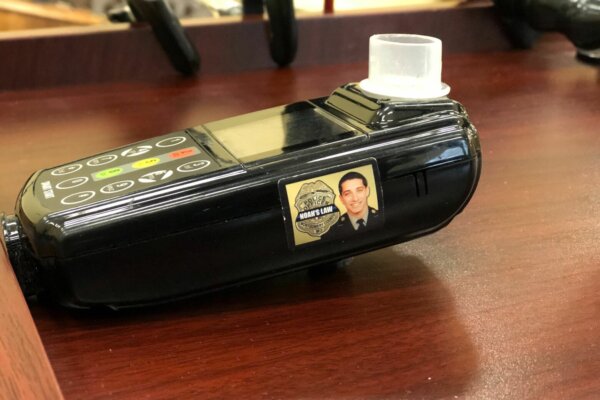In Maryland, drivers who are convicted of drinking and driving are already required to get an ignition interlock device — a piece of technology that won’t allow a car to start if the driver is impaired.
Lawmakers in Annapolis are working to pass bills that would expand the requirement in cases where judges grant probation before judgment — a court action that keeps a conviction off the offender’s record but requires that they complete a period of probation.
Anne Arundel County resident Vickie Brown lost her 12-year-old son Darius when he was killed by a drunken driver in 2004. Brown told lawmakers that the family was coming home from a movie when the crash occurred and that the other driver was traveling in excess of 100 miles an hour.
“I will repeat that: he hit us doing 125 mph, splitting our car in half,” Brown said.
Brown said she couldn’t look at photos of her son or even mention his name for years after his death.
The irony was that Darius had won an essay contest on the issue of road safety and drunken driving, “And almost a year to the date when he wrote that paper, a drunken driver took his life,” Brown said.

Dave Leotta, the uncle of Montgomery County police officer Noah Leotta — who died after being struck by a drunken driver in December 2015 — testified in favor of the bill, telling lawmakers, “An interlock, as you heard, it changes behavior. That’s all it does. It doesn’t impact the person’s life. They can still live the life they want to lead. They just can’t drink and drive.”
Darren Francke, an assistant police chief in Montgomery County, also spoke in favor of the bill before a house of delegates panel in Annapolis. Francke told the members of the Judiciary Committee that he served as a member of the honor guard at Leotta’s funeral.
“I had the tragic honor of laying him to rest,” Francke said, urging for passage of the bills.
“Studies show that over half of those arrested for drunken driving recidivate — they do it again.” Use of the ignition interlocks could save lives, Francke argued.
Another Montgomery County police officer Janice Derbyshire told the panel that a friend of hers, who had struggled with alcohol and who before beginning recovery, had been required to have an interlock device. Derbyshire said her friend kept the device in her car for a year after completing her probation.
“To her, it was a safety blanket, a reassurance to herself that she would choose sobriety and a normal life and a commitment to herself and others that she would not drink and drive again,” Derbyshire said.
During the committee hearing on Wednesday, several lawmakers asked about the costs associated with ignition interlocks.
The Maryland Office of Public Defender issued a statement opposing the House and Senate bills until more information was made available about the possible impact on “indigent communities, especially communities of color.”
The statement from the government relations division of the Office of the Public Defender stated, “The goal of fees is often to recoup costs and generate revenue, but the burdensome impact it can have on those involved in the criminal legal system can be life-changing.”
“In 2021, there were concerns about the costs. That has been addressed,” the House bill’s sponsor Del. Vanessa Atterbeary said, explaining that the Motor Vehicle Administration can extend waivers and fee reductions.
In its 2021 report on the status of the ignition interlock program, the Motor Vehicle Administration wrote:
“Average cost for monthly monitoring ranges from approximately $75 to $100; these costs are comparable to fees charged by providers in other states. Participants can request an administrative program fee waiver and/or reduced provider fees if they meet certain eligibility requirements. Ignition Interlock Program Participation Maryland’s Ignition Interlock Program monitors thousands of participating drivers each year.”








